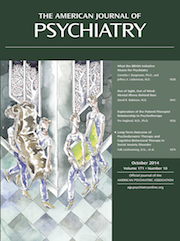Although the release of the first draft of the human genome sequence came in 2001 (bringing subsequent genome-wide association studies and a boost for genetics and genomics studies in identifying genetic causalities), the actual foundations for the field of psychiatric genetics were laid in the late 19th century. Despite the depth and duration of this field’s history, identification of genetic components of psychiatric disorders has been lagging.
Disease heritability for specific psychiatric disorders, such as schizophrenia and bipolar disorder, has been estimated at 80% or even higher. Identifying the underlying genetic etiology is complicated by phenotypic heterogeneity, complex genetic architecture, such as the involvement of multiple genes (polygeny), common genes of small effect, rare, disruptive mutations, copy-number variations, and genetic overlap between disorders (pleiotropy), as well as contributing environmental factors. Advancements in technology and bioinformatics methodology over recent years have provided the means to begin to tackle these issues. This book presents a review of the first fruits of this labor—a resource of the major findings in psychiatric genetics to date, covering a wide variety of psychiatric disorders, from developmental (autism) and adolescence (schizophrenia) to adult (Alzheimer’s disease).
The first few chapters introduce the reader to methodological concepts in the field: genetic epidemiology and sample selection, genetic analysis strategies and techniques, available resources, etc. These chapters are intended to provide the necessary background knowledge for the disease-specific chapters. They are replete with insight and wisdom, and, on the whole, form a very integrated and consistent overview of the relevant concepts. A minor caveat, however, is that the text can be a little dense at times, and unless one has some previous knowledge of genetics, it might be somewhat difficult to follow. Adding supporting illustrations and possibly brief descriptions of key terms in the margins would make the introduction in a future edition more easily accessible to a wider audience.
Disease-specific chapters follow a general structure of an introduction on phenotypic description/epidemiology, various genetics studies and their findings (family, twin, and adoption studies, linkage, and genome-wide association), and any combination of the following: implications for therapy, environmental influences, overlap with other psychiatric disorders, and future outlook. Some chapters are more directed and focus on genes associated with disease (e.g., chapter 14, “Learning Disabilities”), while others are more comprehensive and might include brain imaging data and animal studies (e.g., chapter 19, “The Genetics of Schizophrenia”). The authors do not shy away from describing some of the difficulties in interpreting the data and trouble in replicating findings in linkage and association studies (e.g., chapter 17, “The Genetics of Bipolar Disorder,” p. 202). In general, the respective authors capture perfectly what each disease-specific chapter attempts to accomplish.
Overall, Principle of Psychiatric Genetics will provide a nice resource for those interested in psychiatric genetics. The contributing authors are all prominent, expert members of their fields. Even though a book cannot cover every disease-associated gene in detail, not in the least because of continuous progress and new findings, the book will provide the reader with a sense of the genetic complexity in psychiatric disorders and its associated issues. It is a demonstration of how much the field has progressed and an indication toward a promising future.

